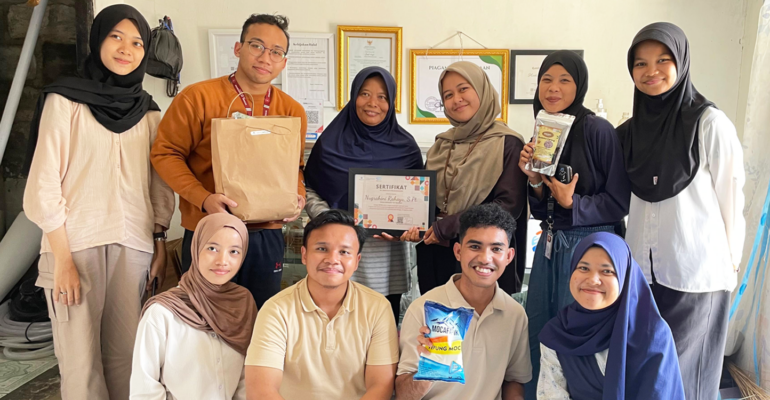CEO School Program of IPB University Visits Rumah Mocaf Barokah: A Local Food-Based MSME

As part of the CEO School program organized by the Directorate of Agromaritime Community Development (DPMA) of IPB University, participants visited Rumah Mocaf Barokah, a micro, small, and medium enterprise (MSME) known for its innovation in utilizing mocaf, or cassava flour, as the main ingredient in its products.
Located in Kp Gunung Leutik Gg Asten, Benteng Village, Ciampea District, Bogor Regency, West Java, Rumah Mocaf Barokah produces various standout products such as dried brownies, cassava noodles, egg rolls, dried cakes, and more—all based on local food ingredients.
Nugrahini Rahayu, the owner of Rumah Mocaf Barokah, warmly welcomed the participants of the CEO School IPB University and explained the vision of her MSME in promoting health and sustainability. “We use local food ingredients with the goal of helping Indonesians live healthier lives and improving the nutritional quality of the community,” she said.
She also explained why her MSME focuses on developing cassava as the main raw material. “Cassava is an easily accessible resource and is available in large quantities in our village. By utilizing this local resource, we not only reduce production costs but also provide direct economic benefits to local farmers,” she explained.
The focus on cassava allows Rumah Mocaf Barokah to create competitively advantageous products while contributing to food independence.
The visit also provided an opportunity for Nugrahini to share the challenges faced by Rumah Mocaf Barokah. One key challenge is how their products can help address the issue of stunting in Indonesia, a challenge posed by the National Population and Family Planning Agency (BKKBN). As part of the CEO School program, Rumah Mocaf Barokah is receiving guidance to find solutions to this challenge, in line with their commitment to making a positive impact on public health.
Additionally, she mentioned other challenges, particularly in marketing. Although their products are of high quality, introducing them to the broader public remains a significant obstacle. Nugrahini is currently working on registering their products with the National Agency of Drug and Food Control (BPOM) to obtain wider distribution approval.
La Ode, one of the student participants in the CEO School program, shared his impressions of the visit. “I am truly inspired by how Mrs. Nugrahini and her team have innovatively utilized local resources. This visit opened my eyes to the importance of perseverance and creativity in developing a business that not only profits economically but also has a positive societal impact,” said La Ode.
The CEO School’s visit to Rumah Mocaf Barokah not only provided insights into the operations of this MSME but also highlighted the challenges and opportunities faced by MSMEs on a national scale. With the support and training provided by the program, Rumah Mocaf Barokah is optimistic about continuing to grow and making a real contribution to public health and environmental sustainability in Indonesia. (*/Rz) (IAAS/RUM)



















